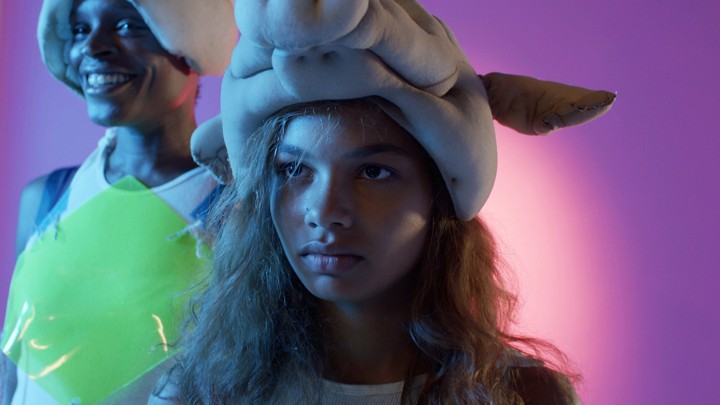We may need a new acronym for the films of the American writer-director Josephine Decker: YMMSV, or your mileage may seriously vary. I came relatively late to Madeline's Madeline in its festival cycle, by which point some colleagues had declared it one of the singular masterpieces of the past twelve months, while others dismissed it as hippy-dippy, arty-farty guff worthy of nobody's time. Perhaps this is only to be expected from a film that often presents as a development of a single point-of-view shot in Decker's previous Thou Wast Mild and Lovely - one taken from the perspective of a cow chewing the cud in a field. (Already, you'll have some sense of what we're dealing with here.) The Madeline of the title (Helena Howard) is a mixed-race teen whose involvement with a local theatre group leads her, in just the film's first fifteen minutes, to imagine herself as a cat - purrily, inviting her mother to tickle her belly - and then a sea turtle crawling towards the ocean; and Decker actually goes as far as to film her actress clambering across a shore while wearing a full-on sea turtle ensemble, complete with little woolly sea-turtle cap. "The pendulum of the mind swings between sense and nonsense, not right and wrong," declares one character around this point, and clearly there are those viewers whose mental pendula swung straight towards nonsense, and lodged there. Your mileage will very definitely vary.
Peer beyond the kook, however, dig beneath the loose, semi-improvised rambling that is the mumblecore alumna Decker's stock-in-trade, and there are other strands here, more involving than those unravelling from Madeline's fishy turtle bonnet. There is, for one, our heroine's troubled relationship with her mother (Miranda July, never more uptight, which is saying something), signalled by a dream sequence in which the girl takes an iron to her guardian's bare hands. There are intimations of self-harm and OCD. There is also some examination of the processes by which we make art and create characters, processes explored in far greater depth here than they were in Glee or Climax, to mention two recent reference points. At the theatre group, Madeline gains a second mother of sorts in mollifying Molly Parker, exactly the kind of sage elder who might flip a wayward turtle over and lead it to sea, while we gain some understanding of art's healing and connecting properties. Those first-reel acting exercises aren't quite as head-in-the-clouds as they first appear, rather a mixture of schooling and therapy; and Madeline will eventually channel both her compulsions and her rage into a showstopping piece of performance art. (The climax is a catharsis in the truest sense.) Beyond all this, and the more generalised (and generic) business of meeting boys and finding one's feet, what Decker vividly conjures is a sense of adolescence as a formative swirl - of moods, influences and emotions, of experiences both real and imagined. The birthing metaphors would suggest that what we're watching is a second gestational period: the film opens with the birth of a girl, and concludes with the birth of a fully independent young woman - and an artist besides.
That process perhaps doesn't call for a director so much as a midwife, and there is a good deal of empathy in place here. Decker's camera clearly adores the radiant Howard - more so even than Andrea Arnold adored Sasha Lane in American Honey - and it keeps on loving and forgiving her long after Madeline has made the misstep of attempting to seduce her dance teacher's partner: this, the film concludes, is just the kind of mess a young woman sometimes makes. There's an indulgence in that empathy, of course; there usually is, in real life as in the movies. Decker tempers it, however, with a jokey self-awareness. When her characters state "it's a metaphor", as they do often enough to set a joke running, it's not down to any hippy-dippiness on her part, but because it's exactly the kind of thing hippy-dippy theatre folk say. I was less enamoured by those cat impersonations, though they'll be a boon for anybody currently compiling a thesis on the feline in post-Varda female-authored cinema; and those scenes in which Decker's ensemble harass a heavily pregnant woman came as a bit of a headscratcher, not least as they're not something anybody would do in the real world, but then - hey - maybe that's a metaphor, too. Your own mileage, as I say, will vary - but there are reasons why Decker is being championed as among the most idiosyncratic talents to have emerged from the US indie sector in recent times.
Madeline's Madeline opens in selected cinemas from Friday, and is available to stream via MUBI.

No comments:
Post a Comment